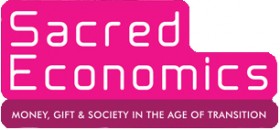Charles Eisenstein
Sacred Economics
Eisenstein wrote his 2011 book Sacred Economics as part of the New Economy movement.[8] The book revolves around the theme of how the current monetary system based on interest and usury, along with the abandonment of the gift economy, led to social alienation, competition and need for an economic system predicated on continuous growth.[9][10] It has been either fully or partially translated into at least nine languages.[11][12] Accordingly, his primary goal is the reestablishment of some form of gift economy as a means of strengthening relationships in contrast to money economies which commodify our relationships and render people interchangeable.[13][14] He asserts that money is created by the conversion of free human interactions into paid services.[15][a] Eisenstein himself attempts to practice the gift economy in his own life.[16]
The book explores additional economic proposals including a negative-interest currency following Silvio Gesell, social dividends, economic degrowth, and a personal emphasis on right livelihood over financial motivation.[17] In other writings, he has also advocated for universal basic income.[18] He describes and rejects what he describes as the myth of scarcity which he claims fosters greed and anxiety.[17][19]


Leave a Reply